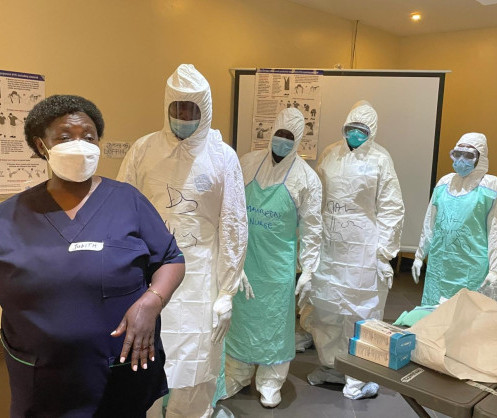Uganda is the first country among WHO member states to implement the Rapid Response Team training package
With financial funding from the Ministry of Health in France through WHO, the two-week training, which began on July 12, 2022, is part of the WHO’s initiative known as the Rapid Response Teams Training Implementation Package (RRT TIP). The ultimate goal of this RRT TIP pilot was to provide the country with the resources, guidance, and support needed to implement a sustainable plan to build the capacity of Rapid Response Teams (RRTs) to effectively respond to all public health outbreaks at the national and sub-national levels.
“The establishment of trained Rapid Response Teams (RRTs), readily available for deployment and response in emergencies is critical in addressing the country’s public health and emergency problems. We appreciate this timely and critical support from WHO and CDC in building capacity of our teams.” –Dr. Jane Ruth Aceng Ocero, Uganda’s Minister of Health.
“COVID-19 has highlighted the need for skills transfer at the national and sub-national levels. The trained National Trainers (ToTs) will be able to conduct and use their knowledge to build the capacity of Rapid Response Teams at the National and subnational levels to effectively and efficiently respond to Public Health Emergencies.” Dr. Yonas Tegegn Woldemariam, the WHO Representative to Uganda.
The establishment of trained RRTs, readily available for deployment and response in emergencies is critical in addressing the country’s public health and emergency problems
“In addition, through the Advanced training for Emergency Responders, the beneficiaries will be able to respond appropriately to public Health emergencies at any time.” Dr. Yonas emphasized.
“Uganda faces a multitude of infectious disease outbreaks across the country every year. Building capacity for multidisciplinary teams at all levels is critical for immediate effective and efficient response to avoid devastating impacts. CDC will continue to partner with Ministry of Health and the World Health Organization to ensure sustainable training plans are in place and surge teams are trained for rapid response teams.” –Dr. Amy Boore, Program Director, Division of Global Health Project, U.S. Centers for Disease Control and Prevention Uganda, U.S. Mission Uganda.
Uganda is the first country among WHO member states to implement the Rapid Response Team training package. All learning resources in the RRT TIP are developed from a global standard perspective by WHO and are meant to be adopted by the Member States in country context to meet their specific needs.
“On August 17 and 18, Uganda will adopt these learning materials to suit subnational Rapid Response Teams for future in-country training.” – Dr. Moses Ebong, Principal Medical Officer, Department of Integrated Epidemiology, Surveillance and Public Health Emergencies Division, MoH.
The RRT TIP audience is segmented into two categories. The primary target audience consists of entities that play a crucial role in supporting ongoing training and local capacity development in areas related to health emergency preparedness and readiness, including relevant Ministry of Health Departments, the Emergency Operations Center, the Incident Management System, National Public Health institutes, local academic institutions, non-governmental organizations, and partners.
The secondary audience for the RRT TIP is national, Regional and District professionals (within and outside the health sector) who are likely to be deployed as managers, trainers, and/or members of Rapid Response Teams.







OTHER ARTICLES
Editorial — Prevent, inform, and act for women’s health in Africa
Kenya : Government Prioritises Maternal Health and Strengthens Support for Community Health Promoters
Strengthening pandemic prevention, preparedness, and response capacities in Senegal using the “One Health” approach